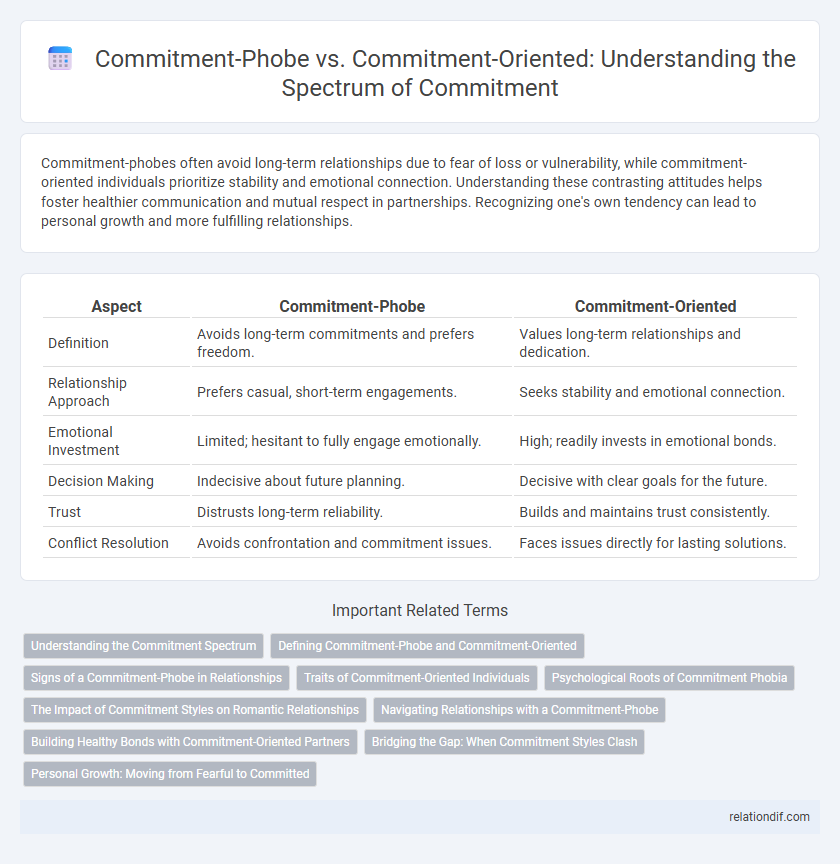Commitment-phobes often avoid long-term relationships due to fear of loss or vulnerability, while commitment-oriented individuals prioritize stability and emotional connection. Understanding these contrasting attitudes helps foster healthier communication and mutual respect in partnerships. Recognizing one's own tendency can lead to personal growth and more fulfilling relationships.
Table of Comparison
| Aspect | Commitment-Phobe | Commitment-Oriented |
|---|---|---|
| Definition | Avoids long-term commitments and prefers freedom. | Values long-term relationships and dedication. |
| Relationship Approach | Prefers casual, short-term engagements. | Seeks stability and emotional connection. |
| Emotional Investment | Limited; hesitant to fully engage emotionally. | High; readily invests in emotional bonds. |
| Decision Making | Indecisive about future planning. | Decisive with clear goals for the future. |
| Trust | Distrusts long-term reliability. | Builds and maintains trust consistently. |
| Conflict Resolution | Avoids confrontation and commitment issues. | Faces issues directly for lasting solutions. |
Understanding the Commitment Spectrum
Understanding the commitment spectrum reveals significant differences between commitment-phobes, who often avoid long-term obligations due to fear of loss or vulnerability, and commitment-oriented individuals, who embrace stability and trust in relationships. Commitment-phobes may prioritize personal freedom and uncertainty over emotional connection, while commitment-oriented people foster strong bonds through reliability and mutual support. Recognizing these distinct mindsets aids in navigating relationship dynamics and improving communication strategies.
Defining Commitment-Phobe and Commitment-Oriented
A commitment-phobe avoids long-term obligations, often fearing loss of freedom or emotional vulnerability, resulting in inconsistent relationship patterns. Commitment-oriented individuals prioritize stability, emotional connection, and reliability, actively seeking to build lasting partnerships. Understanding these contrasting attitudes highlights how personal values and fears influence relationship dynamics.
Signs of a Commitment-Phobe in Relationships
A commitment-phobe often exhibits signs such as avoiding serious conversations about the future, consistently hesitating to define the relationship, and showing reluctance to make long-term plans. They may prioritize personal freedom over partnership, frequently cancel dates or remain emotionally distant despite ongoing involvement. In contrast, commitment-oriented individuals demonstrate clear intentions, communicate openly about expectations, and invest emotionally in building a stable, lasting relationship.
Traits of Commitment-Oriented Individuals
Commitment-oriented individuals demonstrate reliability, strong emotional intelligence, and a consistent dedication to long-term goals, fostering trust and stability in relationships. They prioritize effective communication and exhibit resilience in overcoming challenges, maintaining a balanced approach to personal and professional commitments. Their ability to align actions with intentions distinguishes them from commitment-phobes, who often struggle with fear of attachment and inconsistency.
Psychological Roots of Commitment Phobia
Commitment phobia often stems from deep-seated psychological roots such as fear of vulnerability, past trauma, or attachment issues, which hinder the ability to form lasting bonds. In contrast, commitment-oriented individuals typically exhibit secure attachment styles and a willingness to embrace emotional intimacy, fostering stable and enduring relationships. Understanding the psychological basis behind commitment phobia, including anxiety disorders and fear of loss, is crucial for addressing and overcoming relational challenges.
The Impact of Commitment Styles on Romantic Relationships
Commitment-phobes often experience difficulty in forming lasting romantic bonds due to fear of intimacy and avoidance of long-term obligations, which can lead to instability and frequent relationship breakups. Commitment-oriented individuals prioritize emotional investment and reliability, fostering trust, security, and deeper connection in partnerships. The contrasting commitment styles significantly affect relationship satisfaction, longevity, and emotional resilience, with commitment-oriented behavior linked to higher relationship success rates.
Navigating Relationships with a Commitment-Phobe
Navigating relationships with a commitment-phobe requires understanding their fear of long-term attachment and valuing personal freedom, which often leads to avoidance of deep emotional bonds. Commitment-oriented individuals prioritize stability and emotional investment, seeking clear communication and mutual trust to foster growth. Balancing these opposing perspectives demands patience, empathy, and setting boundaries to align expectations within the relationship.
Building Healthy Bonds with Commitment-Oriented Partners
Commitment-oriented partners prioritize trust, communication, and emotional availability, creating a foundation for long-lasting, healthy relationships. In contrast, commitment-phobes often struggle with fear of vulnerability and intimacy, leading to instability and emotional distance. Building healthy bonds requires recognizing and valuing the commitment-oriented mindset, fostering mutual respect and consistent effort.
Bridging the Gap: When Commitment Styles Clash
Commitment-phobic individuals often avoid long-term relationships due to fear of loss or vulnerability, while commitment-oriented partners seek stability and emotional security in their connections. Bridging the gap requires open communication, empathy, and gradual trust-building to reconcile differing attachment styles. Understanding the psychological roots and respecting individual boundaries can transform potential conflicts into opportunities for growth and mutual support.
Personal Growth: Moving from Fearful to Committed
Commitment-phobes often experience personal growth through self-awareness and overcoming fears of vulnerability and attachment. Transitioning to a commitment-oriented mindset involves embracing emotional resilience, building trust, and prioritizing long-term goals in relationships. This transformation fosters deeper connections and enhances overall well-being by replacing avoidance with intentional dedication.
commitment-phobe vs commitment-oriented Infographic

 relationdif.com
relationdif.com